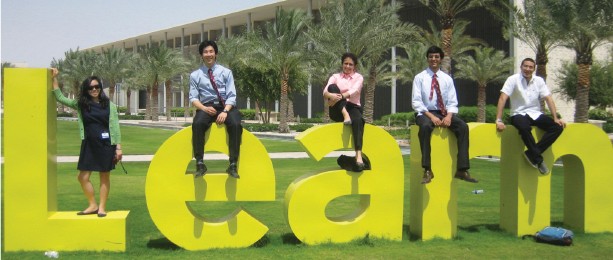CAMPUS LIFE

IthaQatar Ambassadors relax on the WCMC-Q campus in Doha.
Undergrads visit Doha to sow seeds for exchange program
Every summer since 2003, a dozen or so premedical students from Weill Cornell Medical College in Qatar (WCMC-Q) have come to Ithaca for six weeks of research -- and a taste of life on the hill -- before their first year of medical school.
This year, four Ithaca undergraduates -- members of the IthaQatar Ambassadors, a group formed in 2007 to strengthen ties between Ithaca and WCMC-Q students -- went to Doha over spring break week. Their objective: to advocate for an official exchange program that would give three to five Ithaca undergrads and Qatar pre-meds the opportunity to trade campuses for a semester, starting in 2011 or '12.
The students also got a taste of daily life at WCMC-Q, collected ideas from students and brainstormed other ways to keep students in Ithaca and Doha connected throughout the school year.
The trip was the result of months of research and planning by a team of students on both sides of the Atlantic. When the Ithaca students arrived in Doha to present the proposal, their WCMC-Q counterparts Zena Ghazala '13, Maen Abou Ziki '13 and Pankit Vachhani '12 had already laid the groundwork and set up meetings with top administrators, faculty and staff.
"We were able to hit the ground running," says Jonathan Soh '10, who will return to WCMC-Q after graduation to work as a teaching assistant in chemistry and biology. "We really felt like a true team."
An official exchange program would be valuable both academically and culturally, the students say, by giving Qatar pre-meds a chance to take a wider variety of courses and facilitating new interactions between students on both campuses. Ithaca students traveling to Doha could also benefit from Qatar's new research facilities and rapidly expanding scientific community.
The program could also lead to an avenue for WCMC-Q pre-meds who are not immediately accepted into medical school to finish their undergraduate degrees at Cornell. (WCMC-Q students must complete a two-year premedical program, then apply for medical school.)
The response -- from administrators and students -- was overwhelmingly positive, says Isabella Spyrou '11.
"We weren't really sure, going in, how we would be received," she says, particularly with regard to logistical issues. But discussions about housing, funding, tuition and coursework all yielded workable solutions.
David Robertshaw, professor emeritus of biomedical sciences and former WCMC-Q associate dean, traveled to Doha with the group -- but only as an observer. "This whole thing came from the students on both ends -- not from administrators, not from the faculty," he says.
And the best part of the trip was getting to know their counterparts better, the students say.
"Everyone there was so welcoming and receptive to us," says Spyrou.
With classmates as guides, the Ithaca group got a taste of Doha life, from shopping at the souk (marketplace) and watching a camel race to visiting the northern desert and jet skiing in the Arabian Sea.
They also gave a presentation about life at Cornell's main campus, including sports, student life, academics and activities in Ithaca, says Frances Kim '11.
The experience was a reminder that people from different parts of the world can be very similar, says Allen Miller '11. "As long as you have an open mind and are willing to respect the differences, at the end of the day we're all the same."
Now, the four are preparing to host the Qatar students who are headed to Ithaca for the summer.
"And we're going to do our best to make sure they feel right at home," Soh says.